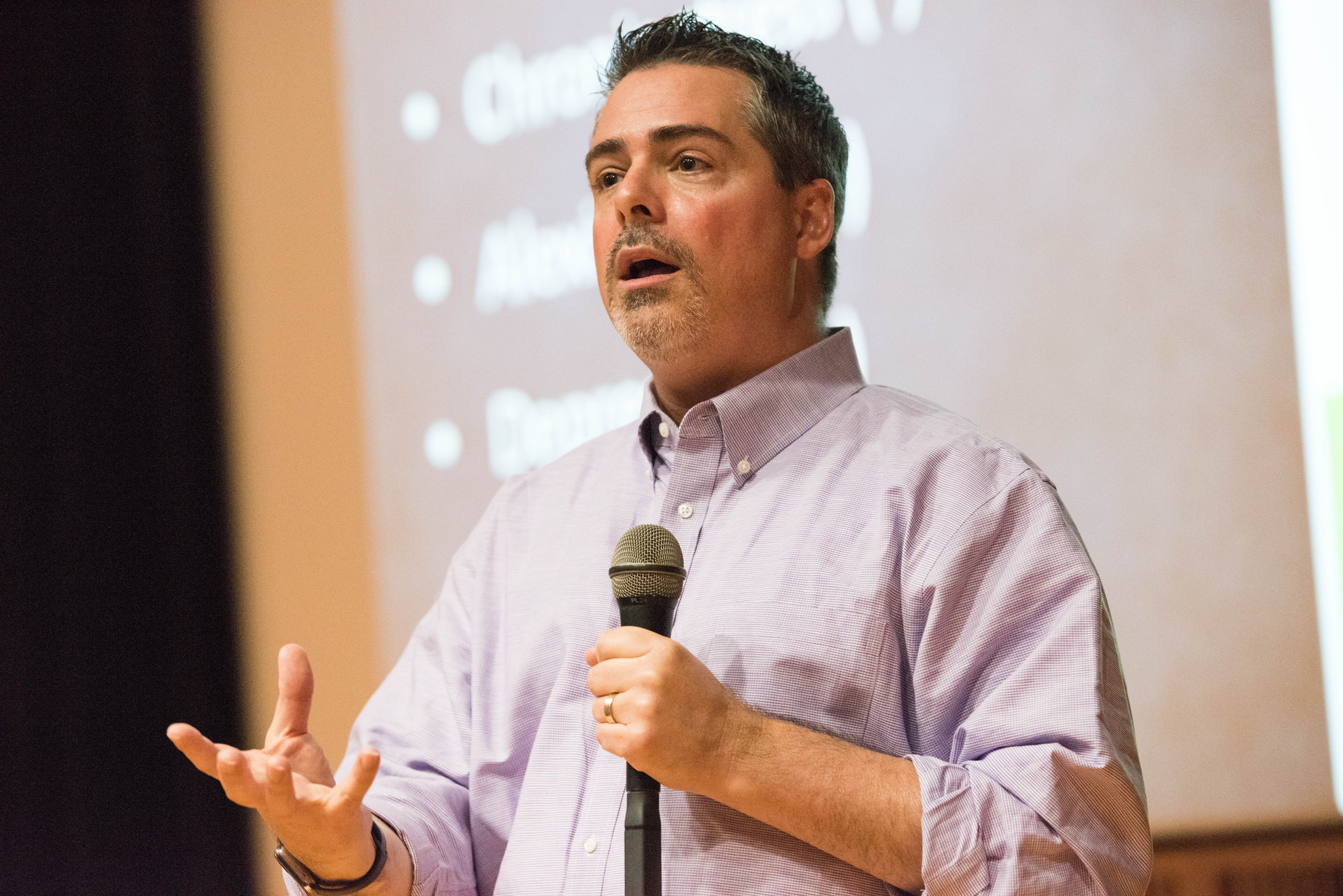Published on

Kory Floyd speaks about humans’ need for affection. Floyd spoke during the 13th annual Life Sciences and Society Symposium on Saturday, Oct. 7. | Photo by Roger Meissen, Bond LSC
By: Samantha Kummerer, Bond LSC
Kory Floyd was stressed and having an all-around bad day, but then a coworker offered him a hug.
“That hug didn’t change anything about what had gone in my day but it changed everything about what the way that I felt,” Floyd said. “Suddenly all that stress, suddenly all that disappointment, all that worry, it didn’t go away but it seemed to lift off my shoulders, it wasn’t weighing me down.”
Floyd studies how prosocial communication, like affection, compassion, and trust, affect individuals psychologically.
He spoke specifically on communicating affection during the Life Sciences and Society Symposium on Saturday, Oct. 7.
Affection can be communicated through verbal and non-verbal communication as well as through supportive behavior. This last category is one he discovered through his research. Supportive behavior like keeping someone’s car in good condition or helping someone with a task is sometimes the most common way of expressing affection, especially between men.
The University of Arizona communications professor said he started his research by exploring an aspect of affection that confused him in his life. Growing up in a family of huggers, Floyd said he soon found out that not everyone appreciated the same type or kind of affection.
Expressing affection can be risky. Affection can be misinterpreted or not reciprocated, censured by culture, and even transmit disease.
So why bother?
For Floyd, the answer is simple, “Affection as an emotion and behavior is a fundamental human need.”
To elaborate on his belief, he pointed to how humans are born dependent on others to survive for many years. A child needs someone to feed, protect, provide for it and often make huge financial and personal sacrifices. As Floyd points out, many parents willing to do this due to love.
“I don’t think it’s necessarily a stretch to claim that an infant’s ability to get someone to love it is a matter of life or death.” He theorized. “It is a matter of that infant’s survival to get someone to feel a strong enough emotional investment that they are willing to make all the other kinds of investment that are required for that’s infant’s survival.”
As we age, affection transforms into something that feeds our need to belong.
Floyd’s studies have revealed positive associations between affection and happiness and social engagement. Other research revealed that affectionate communication is associated with mental wellness and physical health. When exposed to stressful events, highly affectionate people react with less arousal and recover faster. When compared to a less affectionate person, the more affectionate person has a better immune system, lower blood glucose levels and improved cortisol rhythm.
“It’s really difficult to thrive without some measure of affection,” Floyd concluded.
While not everyone needs the same amount of affection, it is a ubiquitous form of prosocial communication.
“None of what I described here is a prescription for you to go out and start hugging people on the sidewalk, that is not a pathway to health, that is a pathway to incarceration,” Floyd joked as he concluded his talk.
Instead, he highlighted that affection is different than other communication behaviors because it is something we reserve for only the important relationships in our lives.
“We talk to anybody, we gesture to anybody but we don’t kiss just anybody, we don’t hug just anybody,” He said. “This is a special behavior and its something that we preserve and reserve for the very special people in our lives.”
The 13th annual Life Sciences and Society Symposium, The Science of Love, started Friday, Oct. 6 and Saturday, Oct. 7. It features six experts that research various aspects of love, relationships and connection. The event will conclude on Friday, Oct. 13 with its last speaker, Jim Obergefell, who was the plaintiff in the 2015 Supreme Court case on marriage equality.